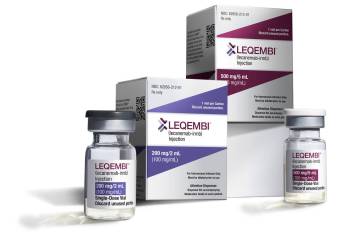Study shows drug slows Alzheimer’s in patients with mild disease
An experimental Alzheimer's drug being tested at the Cleveland Clinic Lou Ruvo Center for Brain Health in Las Vegas has preserved more cognitive and functional ability in patients who took the medication early in the course of their disease, according to new data released on Wednesday.
Eli Lilly and Co. presented new followup data from two large trials of the infused drug solanezumab at the Alzheimer's Association International Conference in Washington.
The Ruvo Center will continue to recruit patients for its research effort until the study meets its quota.
Dr. Charles Bernick, associate medical director of the Ruvo center, said he hopes the promising news about solanezumab will encourage more people to volunteer for the Anti-Amyloid Treatment in Asymptomatic Alzheimer's study, or A4.
"The reason it takes so long to get any trial done is the recruitment," Bernick said. "If we could accelerate the number of people we have coming into the studies, we'd be able to get these trials done sooner and get our answers sooner."
In 2012, initial 18-month studies of solanezumab failed to slow cognitive declines or loss of abilities of daily living for the entire patient population. However, when Lilly analyzed results only for patients with mild forms of the disease, the data suggested solanezumab caused a significant 34 percent slowdown in mental decline and an 18 percent slowdown in loss of functional abilities compared to placebo, researchers said.
To better assess whether mildly impaired patients benefit from the drug, Lilly extended its two trials by another two years and only enrolled those with mild disease. Researchers continued to provide solanezumab to patients who had taken it during the studies and also allowed patients who had been given placebos to switch over to solanezumab.
Ruvo center researches still are looking for people in an asymptomatic stage of Alzheimer's disease for the A4 study. Bernick said a certain amount of memory loss will not exclude a participant from the study.
Subjects must score on cognitive tests within a normal range of other people their age, he said. Anyone diagnosed with Alzheimer's or taking any other medications for the disease does not qualify.
Since the beginning of the year, Bernick has screen about 50 people, and only seven have progressed to the treatment phase.
Participants will be randomized to receive either solanezumab or a placebo once every four weeks by intravenous infusion. The so-called double-blind study means neither the researchers nor the participants know whether they are getting the drug or a placebo.
Solanezumab works by blocking formation of a protein called beta amyloid believed to cause toxic brain plaques that are considered a hallmark of Alzheimer's. Eric Siemers, medical director for Lilly's Alzheimer's team, said if solanezumab can slow disease progression by roughly a third, as it did in the first two Phase III trials, that would be very meaningful to patients.
Positron emission tomography, known as PET scans, a test that shows how organs and tissues are working, will be used to determine whether participants have evidence of elevated buildup of amyloid, a protein found throughout the body. Participants should have normal thinking and memory function and evidence of elevated amyloid. Amyloid plaques can accumulate outside nerve cells and can lead to cell death in some people.
The overall goal of the study is to determine whether decreasing amyloid in the brain with antibody treatment can help slow the memory loss associated with amyloid buildup. The study also seeks to discover more about brain markers and other tests to better predict who will experience memory decline and progress toward Alzheimer's-related dementia.
Reuters contributed to this report. Contact Steven Moore at smoore@reviewjournal.com or 702-380-4563.




























